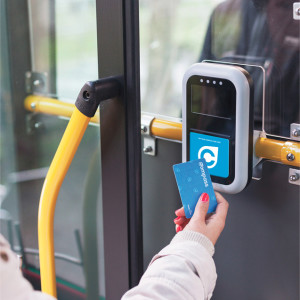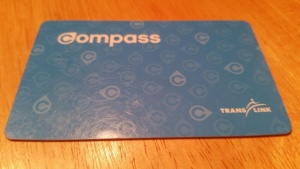By Jamie Rich, Crisis Line and Intake Coordinator at Battered Women’s Support Services
The dangers women face when navigating and exiting an abusive relationships are many, and the compass card system has provided another tool in the arsenal of abusers.
 BWSS is concerned about the compass card transit system and the risks it poses to women in abusive relationships. For those who don’t know, compass cards can be used to track the exact time and location a woman uses transit, so an abuser could note when and where a woman is at a regular time, or otherwise use her movements as a way to exert power and control. With access to a woman’s transit pass information, an abuser could track a woman to her new location based on a regular bus stop, for example. For women living in shelters or transition houses after fleeing abuse, this puts not only themselves, but other women escaping violence at risk. I cannot overemphasize how concerning this is for women’s safety.
BWSS is concerned about the compass card transit system and the risks it poses to women in abusive relationships. For those who don’t know, compass cards can be used to track the exact time and location a woman uses transit, so an abuser could note when and where a woman is at a regular time, or otherwise use her movements as a way to exert power and control. With access to a woman’s transit pass information, an abuser could track a woman to her new location based on a regular bus stop, for example. For women living in shelters or transition houses after fleeing abuse, this puts not only themselves, but other women escaping violence at risk. I cannot overemphasize how concerning this is for women’s safety.
In a recent interview with Global News, BWSS’s Executive Director, Angela Marie MacDougall, described some of the problems this tracking system poses for women’s safety (see the article here). The article also features Anne Marie Aikins, senior manager of media relations at Metrolinx, an agency that runs a similar system (PRESTO) to the compass cards in Ontario. Some of her statements in the article, which are quoted below, are troubling for women experiencing violence, and here is why.
“If somebody had a woman under that much control, then there are probably other things that they are doing. Credit cards, banking information.” This evades the point: that tracking someone’s exact location at a specific time is highly dangerous for women facing abuse, and that this problem is specific to transit, rather than bank accounts. By deflecting the problem away from a transit issue, this suggests that there’s no responsibility on the part of the transit system.
Absolutely, we MUST hold controlling and abusive partners accountable for their actions – and primarily accountable, at that. But if you dismiss the problem by suggesting that abusers will just find another way to track women, as through credit cards, you are denying the fact that transit tracking can be used as a tool of abuse. That sends a dangerous message to women who experience violence – that we don’t care if we provide abusers with tools.
“ ‘I know men, abusive spouses, will use ways to monitor you. Whether it’s a PRESTO card, a credit card, your banking information, your phone calls, they often will track them.’ If someone was asking to track your whereabouts, that would be a big clue that you’re in an abusive relationship, she said.” This suggests that the real problem is that women are oblivious to the fact that they are being abused; that somehow, learning that your partner tracking your movements on transit is the red flag women need to finally recognize the abuse.
Let me be clear: that is not the problem at play, and it puts the responsibility for the abuse back on the woman, rather than the abuser or the tools being handed to them. As Angela noted, abuse escalates when a woman is leaving the relationship. She doesn’t need the ‘clue’ about the abuse – she needs safety and the right to live violence-free, not more tools to abuse her.
“Then you have to use whatever’s the right time for you to get out of a relationship.” This statement distances the conversation from the issue at hand and ignores the relevance of the transit pass tracking. And what does it mean, “to use whatever’s the right time”? A major concern with transit pass tracking is that both location AND time are tracked. When is a safe time, if someone has extra tools to know where you are when you leave the home? Again, this deflects from the issue and puts the onus on the woman to figure out a way around the “wrong” time. For women who have already left an abusive relationship, the “right time” has already come and gone. If an abuser uses her transit activity to track her back down, when she left not relevant, but how an abuser found her is.
Women escaping abusive relationships already face so many barriers in breaking free of power, control and violence. Let’s not be complacent in adding another barrier.
 Jamie Rich
Jamie Rich
Jamie Rich is the Crisis Line and Intake Coordinator at Battered Women’s Support Services. She is passionate about creating safe spaces for exploring social problems and social change, promoting mental wellness, fat politics, and working with and empowering diverse women. She is equally passionate about chocolate.






Hello
Interesting article. One thing should be noted is that not every compass card needs to be registered and also compass card accounts are password protected. I would believe that in abusive relationships even internet passwords aren’t safe so i understand your argument completely.
I think it would important to point out the impact of google’s locations services found on android mobile devices. For the most part people have this turned on and don’t even now it. with google’s location services anyone with access to your google account would be able to track your movement via the on google maps through the gps on your phone, i feel like this sort of invasive information could me more dangerous to individuals fleeing from abusive relationships.
This is a real problem, could one possible solution be getting a new compass card? If the $6 deposit is a barrier then maybe there’s a way to help out with that, but a fresh card wouldn’t be associated with previous cards or account numbers
Use cash or get a second unregistered compass card.
We need practical solutions, not more things to fear, but thanks for pointing out a potential safety issue anyway.
If the woman is in a shelter or a new place, how would the abuser have access to the Compass Card and how would they have access to usage times, places etc?
Can members of the public access this information, ie on line?
How is someone able to track someone else’s use of a Compass card?
This seems unlikely? Seems that an abusive partner would just take advantage of the GPS capabilities of phones, no? Compass card tells you where someone was. By the time it’s on the server it’s old information. GPS on the phone is both a live feed of where someone is at all times and a log of where they were.